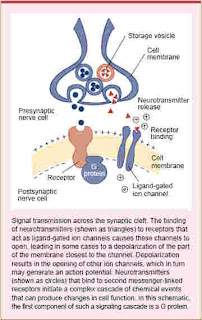Professor Henry Markam is the project director. He has announced that his team will develop the world’s first artificial conscious and intelligent mind within a decade. Project investors include the Swiss government, IBM, and the European Union.
Markam’s strategy is to take apart actual brains cell by cell, dissecting the brain at the cellular level, analyse the billions of connections between the cells (neurons), and then plot these connections into a supercomputer (IBM Blue Gene). The computer is able to simulate the workings of about 10,000 neurones. This is about to a single rat’s neocortical column. The difference between the brain of a mouse and the brain of a human is basically just volume – humans have many more neocortical columns and thus neurons than mice.
In a few years we will know if he succeded or not.
]]>The new edition of a neurology book, “Progress in Brain Research.”, analyzes new studies which provide evidence that the aging brain is simply taking in more data and trying to sift through a clutter of information, often to its long-term benefit. (REISTAD-LONG, 2008)
In my opinion, with all the evidence that lately becomes available, we can view our brain as a “muscle”. If we use our brain to investigate and think about new and different subjects the brain will remain in a good shape, otherwise there is a great danger of deterioration and brain diseases.
Reference
SARA REISTAD-LONG (2008). Older Brain Really May Be a Wiser Brain. The New York times. Available at: http://www.nytimes.com/2008/05/20/health/research/20brai.html?_r=1&oref=slogin
Brain cells (neurons) communicate with each other through their synapses. (Synapse [sinapsis] is a Greek word meaning union or “fasten together”)
 The above picture is from (AHRW,1997).
The above picture is from (AHRW,1997).
The brain creates paths. The most travelled paths in the brain are those that their synapses are active and well established. The harder these chemical bonds are the harder it is to change the path of a given pattern or thought or habit.
Brain researchers have discovered that when we consciously develop new habits, we create parallel synaptic paths, and even entirely new brain cells, that can jump our trains of thought onto new, innovative tracks. It turns out that unless we continue to learn new things, which challenges our brains to create new pathways, they literally begin to atrophy, which may result in demenia, Alzheimer’s and other brain diseases. (RAE-DUPREE, 2008)
Why our brain choose to use only certain types of learning?
Why do we think that those who think like us are smarter?
It is easier to answer the second question, but a challenge would be the efford to understand other people’s way of thinking. Accept another viewpoint! Many communication problems can be solved when accepting another viewpoint.
My initial question was which representation could be better to simulate the brain. I think that neuro fuzzy networks are perhaps a better approach to simulating a brain.
A neuro-fuzzy system is a fuzzy system that uses a learning algorithm derived from or inspired by neural network theory to determine its parameters (fuzzy sets and fuzzy rules) by processing data samples. (Nauck, 1997)
The brain strives to understand itself and explain its function. From my small research so far I have found amazing things. A software implementation of the brain can help us understand better its function.
References
ALCOHOL HEALTH & RESEARCH WORLD (AHRW)(1997)THE PRINCIPLES OF NERVE CELL COMMUNICATION Available at: http://pubs.niaaa.nih.gov/publications/arh21-2/107.pdf
JANET RAE-DUPREE (2008).Can You Become a Creature of New Habits? The New York Times© 2008. Available at: http://www.nytimes.com/2008/05/04/business/04unbox.html
Detlef Nauck(1997). What are Neuro-Fuzzy Systems? Availabe at: http://fuzzy.cs.uni-magdeburg.de/nfdef.html
Lotta Fredholm(2008) Ivan Petrovich Pavlov Copyright © Nobel Web AB 2008 Available at: http://nobelprize.org/educational_games/medicine/pavlov/readmore.html
]]>